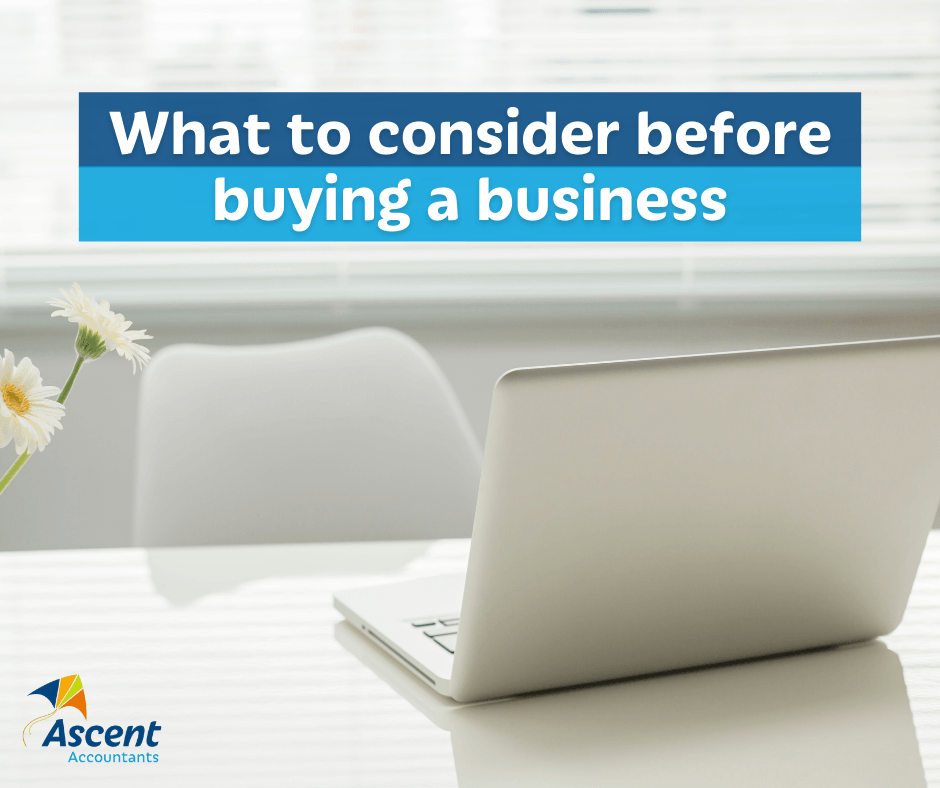What to consider before buying a business

One: What is the reason for the sale?
Finding out the reason for a business sale is easier said than done – but when possible, try to do your research into why a business is being sold. It could be harmless, such as retirement or separation. But sometimes it can be an indication of underlying issues such as the business heading in a bad direction. This information can not only help make your decision to purchase more educated, but also, should you go ahead, give you a better idea from the get go of what needs working on as soon as possible.
Two: What are you buying?
At the end of the day, you’re not buying the business, you’re buying the businesses trade and assets.
It’s important to establish exactly what assets you’re buying and how much you need to pay, and then deciding whether or not they are actually worth it.
Three: Has there been a restraint of trade?
This is a pretty basic one, but you would be surprised by how many purchasers try to save money on professional advice before buying a business. Without this professional advice, you might be blindsided by obvious and extremely problematic issues.
An example of this is a Restraint of Trade. This is a clause that is often in an employee’s contract that after the termination of employment, they are not allowed to perform similar work or accept future employment in competition with the current employer for a certain period of time after the termination.
This is always something worth checking.
Four: Do your due diligence
Be sure that you do a thorough review of the business and don’t get tricked into accepting limited information. At the end of the day, you’re the one with money on the line so you can make these fair and necessary calls.
This digging can potentially cost you, but in the scheme of things, it won’t cost as much as you think and could end up saving you big time. Something like hiring an accountant to run the numbers and assess the business can be extremely valuable, so try to not be turned off by the initial up front costs. You can also use their services to prepare a simple cashflow forecast, highlighting your peak cash needs. This way you have a better understanding of the working capital needed to continue running the business.
Five: Consider the staff
Getting good and reliable staff can be one of the toughest challenges when running a business. When there is a change of ownership in a business, it is quite common for staff to walk. This is unfortunately unavoidable and is all part and parcel of the process – and is something you do need to keep in mind and be prepared for when making any decisions about buying and managing a business.
Six: Don’t forget about real estate
If you are buying a business that has a premise, it’s important to establish whether or not that land or lot is owned or leased. Especially if the space is leased, there are extra things to then consider. How much longer is left on the lease? Are the current premises actually suitable? How’s the location? Does any maintenance need to be done? Ensure you do your due diligence, not just about the running of the business but about it’s associated premises!
Seven: Get to know the key relationships
Continuing or building a successful business can mean that you either need to establish or continue relationships with so many areas of people such as staff, suppliers and customers. You will need to quickly establish the important relationships that are worth investing in to ensure the ongoing success of any business you purchase.
Eight: So how much should you pay?
Unfortunately, accurately valuating businesses, especially small businesses, can be a very difficult task. This is usually due to the heavy involvement of the owner. Often taking away the business owner means taking away the business too. It’s sadly very common for people to pay massive sums for a small business, only to end up being much worse off financially.
When it comes to purchasing a business, it’s often just dependant on how much money the buyer has to spend. There is no simple and clean-cut answer and negotiation will always be a huge factor.
Need help with your accounting?








